OCT 2014
AUDIO BOOK REVIEWS
by Jonathan Lowe
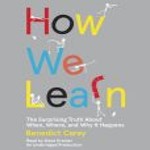 |
Steve
Kramer reads HOW WE LEARN by Benedict Carey,
which bears the subtitle “The Surprising Truth
About When, Where, and Why It Happens.” One
of the surprises is that the traditional method of
cramming for tests is not effective in many cases.
Science has shown that the brain has many complex
ways to arrange perception, memory and retrieval,
and sleep patterns figure into this. Oddly, we learn
different things in different ways, and what you’re
learning determines whether you should stay up late
or go to bed early prior to being tested. Also, the
usual method of finding a quiet place to study isn’t
as effective as learning in the same setting as you’ll
be tested. Instead of being a distraction, music or
sounds can aid learning, especially if those same
sounds are repeated during the exam. The science behind
how learning is best achieved is examined here, Carey
being a medical and science reporter for the New York
Times. The audiobook will help students, musicians,
and anyone else struggling with memorizing or just
trying to get through college with less stress. |
|
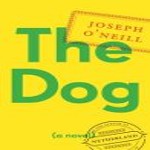 |
Few novels are “different,” meaning that
they follow little traveled paths. One such novel
is THE DOG by Joseph O’Neill.
Of course it’s a literary novel. By that I mean
the sentences are long and introspective, even analytical,
as opposed to short and focused like a darts player
trying to score points. This is a book asking you
to think and observe, not merely to be driven around
in a race car looking for a checkered flag. It’s
an anti-Patterson novel, having no tight, ominous
structure or 120 chapters containing one-word sentences.
Riveting and page-turning? Hardly. But you are moved
in odd ways and learn things you don’t already
know, (or have already read 120 times.) Is this not
a plus? It would be, if our culture made sense. What
better way to tell a story set in Dubai, about a man
who is “in the doghouse” with his girlfriend
(and who goes to take a job in that ultimate wet dream
of American culture) than to make it part angst over
guilt, part revelatory confessional, and part observational
travelogue? His internal examination, sometimes lost
and plaintive, is also funny, ironic, didactic, and
always aware of being on the outside of the hedonistic,
simplistic decadence surrounding him (the Emeratis
turning the American dream of a life of leisure and
bling into a nightmare of the ultimate nirvana: ironic
in its own way since more radical Islam believes that
nirvana—life itself—begins only at death.)
The outward story, in which a nameless protagonist
cannot find the peace he seeks, (while examining his
choices along the way), succeeds in ways a suspense
or mystery novel with a neat Hollywood wrap-up cannot.
So, while it’s not as exciting as pop formula
novels, it’s also not as shallow, either. It's
more like real life, in which we are all seeking things
we hope will satisfy, even if we know they may only
make us victims of our delusions in the end. I enjoyed
The Dog for another reason, too. The setting is Dubai,
(which I also chose as setting for my novel The
Miraculous Plot of Leiter & Lott,) that walks
the line between suspense and literary. As read
by actor Erik Davies, The Dog becomes an
enlightened journey down a road less traveled, with
a tour guide whose tone matches the material, while
the material itself renders rewards to those patient
and brave enough to listen to the truth told by a
tortured everyman.
|
|
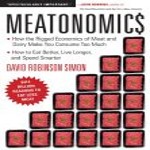 |
The
cost of eating meat is more than substantial. If Americans
gave up meat today, one sixth of the country would
be returned to other agriculture or native use, an
output of greenhouse gases greater than that produced
by internal combustion engines would be curtailed,
and untold billions would be saved in payouts that
are given as subsidies by the government to keep meat
cheap in visible price at (invisible) taxpayer expense.
That Big Mac is more expensive than you think: it’s
more like $11. So says David Robinson Simon
in MEATONOMICS, detailing the $414 Billion
which meat eating costs society each year. And then
there’s the pollution which cow, pig, and chicken
manure produces, and the depressing cruelty that the
meat industry’s robber barons impose on animals
to process them quicker (with hormones) in the Nazi
war camp conditions of feed lots, tight stinking pens,
and darkened grain barns that look like barracks for
prisoners. (I recall seeing a report on a pig processor
in North Carolina that wouldn’t let the press
in to take photos, or even show them the kill floor
without cameras. Aren’t pigs highly intelligent
and sensitive creatures whose organs can often replace
our own?) Simon relates the costs to the economy and
the world due to meat consumption, as more land and
water are used to produce grain for animal production
than for human Americans…while grains are not
meant to be eaten by cattle, and can make them sick.
Used to be, he says, that thousands of small farmers
raised cattle and other animals on open grass ranges,
but in recent decades the trend has gone toward giant
corporate farms who hustle cattle into fed lots ever
earlier, while chickens never see the light of day.
Narrated by the always engaging Christopher
Lane, this audiobook is a must hear for anyone
wanting to lift the curtain hiding butchers from investigative
audit. The book ends with a solution sure to be fought
by the massive meat lobby and Cargill: a tax on meat
consumption to make the prices reflect what Americans
are actually paying anyway. Fish farms are also a
target. Not only are inferior fish escaping from farms
(such as in Alaska) and breeding with wild species,
but if something isn’t done soon, fish populations
will collapse because fishermen are being paid to
fish ever dwindling stocks…which they wouldn’t
be doing if they weren’t being paid by subsidy
checks taken directly from our wallets in taxes. |
|
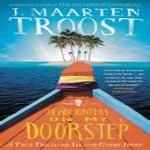 |
Facing one’s inner demons sometimes requires a
journey that is both mental and physical. For J.
Maarten Troost, travel memoirist, the demon
was drink and the journey one parallel with Robert Louis
Stevenson, whose travels took him away from western
civilization into the vast Pacific of the soul. With
a title like HEADHUNTERS AT MY DOORSTEP,
one conjures, at first, the image of savages coming
for a visit, but here the true savages are the illusions
spun by Mad Men in their cagey offices, lit by artificial
light, where from numerous bottles pour the elixir of
intoxicating deceit. Stevenson was a tale spinner too,
but of a quite different kind, and Troost’s quest
was to discover why he chose Samoa to end his days instead
of London or Australia or even New Zealand. Discovering
that answer puts one in perspective of life itself,
as the old romantic world of adventure slowly slips
under the waves, just as the island atolls do which
are now being inundated due to global warming and overpopulation.
What’s left of imagination now, after all, in
our world of 3D fantasies engineered by supercomputer,
and supported by cartoon superheroes wearing junk food
logos? Is there a Treasure Island left, or has it too
succumbed to gaudy hotels, taxis, and all-you-can-eat
buffets? Troost, who has lived in Kiribati, Fiji, and
Vanuatu (among other places), attempts to answer Stevenson’s
riddle of “here he lies where he longed to be”
in the most personal way one can: by stepping in the
writer’s shoes and exploring what is left of the
lost horizon on the vast backwater of a Hollywood lot.
Tour guide is the inimitable Simon Vance, reading
a memoir that is both insightful and delightful
in its mastery of language and fearless, unblinking
honesty. |
|
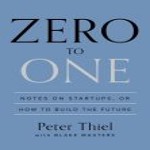 |
Finally,
a new audiobook titled ZERO TO ONE by Peter
Thiel and Blake Masters explores the seven
questions which start-ups should be asking prior to
launch, and how the future may be revolutionized by
innovation. No one knows what the future may hold, and
many people fear the future while believing that most
of the secrets once sought by explorers have already
been discovered. With this fallacy firmly assumed by
most peers and MBA professors, the goal has become to
add small increments of efficiency to already established
models or products. But competition in this way is for
long-term losers, says Thiel. Even talent shows like
AGT or The Voice reward those who sing well-known songs
just a bit better or with more feeling or with a personal
twist. Yet try an original song that is unfamiliar,
and your job may become harder, (with a second barrier
to success added), but the rewards are exponentially
greater. Going from zero to one means to create something
new out of nothing, not merely to improve on what already
exists in competing for market share. It requires courage
and vision to think outside the box or bun, but Thiel
argues that this is the kind of thinking the world needs
most in order to survive the future, and so it is progressive
thinking which business start-ups should be doing in
making their first critical decisions, (including staffing.)
He gives examples of companies which chose right or
wrong at the beginning, and how Hewlett Packard dropped
the ball by losing focus. Intriguing and insightful,
this audiobook should be required listening for those
going into the Shark Tank and wondering if their product
or service will fail or blossom. Narrated by
Blake Masters, it is a motivating conversation
with innovation itself that can shape your destiny by
changing the very world where customers live. |
|